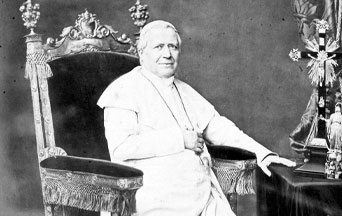
Many Catholics today are unaware of the immense contributions of the Ultramontanes of the nineteenth century to the resurgence of Catholicism worldwide. Prof. Fernando Furquim de Almeida (1913-1981) studied the Movement and produced dozens of articles detailing its work. We have edited these articles and will be featuring them. They highlight the actions of Ultramontane leaders in England, Spain, Italy, France and Ireland.
The rapid growth of Catholicism in England raised several problems. Cardinal Nicholas Wiseman, Archbishop of Westminster, sought to address these with his usual energy. He decided that the only definitive solution would be to train a group of priests fully devoted to the Catholic movement he created. In line with his wishes, Father Henry Manning founded the Oblates of Saint Charles in 1856. This community operated under rules inspired by Saint Charles Borromeo. Completely subordinated to the Cardinal’s authority, they gave his works new momentum.
The Oblates faced difficulties typical of a rising movement. Under the Cardinal’s patronage, however, its opponents could only delay its development.
The real threat to the Archbishop’s apostolate lay in the atmosphere of Catholic liberalism that Lord Acton and The Rambler sought to infiltrate into England. Both were aided by “old Catholics,” the remnants of the era resigned to living meekly under the harsh conditions before the re-establishment of the hierarchy. These apprehensive men saw any combative apostolate as madness.
Father Manning was the liberals’ decided opponent. Before moving on to his relentless struggle against The Rambler, we must look at the circumstances that made the “old Catholics” dangerous, despite their being a weak and expressionless group.
We will also see how the liberals were utterly defeated.
Eternal and Natural Law: The Foundation of Morals and Law
Cardinal Wiseman, struggling to reconquer England for Catholicism, could not devote himself to the administrative affairs of the Archdiocese of Westminster. Accordingly, he had entrusted them to Bishop Errington, his coadjutor. A great administrator, the latter was a worthy assistant to the cardinal. However, Bishop Errington was an “old Catholic,” and as coadjutor, he was entitled to succeed to the Archbishopric when Cardinal Wiseman passed from the scene.
Father Manning feared for the fate of the English Catholic movement if Bishop Errington ascended to the See of Westminster. In Father Manning’s opinion, Bishop Errington “would jeopardize Wiseman’s entire work and set back the progress of Catholicism for a whole generation.”
Father Manning expounded his thinking in a memorandum about Bishop Errington. The important question, he wrote, was “whether or no the Church in England shall content and confine itself to a better administration of Sacraments to the small communion of Catholic sojourners in England or shall mingle itself in the life of the English people, act upon its intelligence by a mature Catholic culture, upon its will by a larger and more vigorous exercise of the powers which are set in motion by the restoration of the Hierarchy.”1
Convinced of the need to remove his coadjutor, Cardinal Wiseman began negotiations in Rome in 1859. Of course, Bishop Errington defended himself. At the same time, Catholic liberals took advantage of the issue to strengthen their ties with the “old Catholics” in the fight against Manning’s growing influence.
 Learn All About the Prophecies of Our Lady of Good Success About Our Times
Learn All About the Prophecies of Our Lady of Good Success About Our Times
Bishop Errington resigned in July 1860 after a formal order from Pope Pius IX. This development did not end the “old Catholics” and liberals’ campaign against Father Manning. They accused him of promoting divisions within English Catholicism. They further claimed that his ‘authoritarianism’ would become disastrous if he continued to influence the destiny of the Church in England.
Cardinal Wiseman died in February 1865. The Westminster chapter, supported by several bishops, elected Bishop Errington as Vicar Capitular.2 This election of a prelate who had resigned on the Pope’s express order was an act of insubordination to the Holy See.
Mgr. George Talbot, an English prelate and close friend of Pius IX, proposed appointing Father Manning to succeed the Cardinal. Father Robert Aston Coffin, a convert from Oxford and at that time Provincial of the Redemptorists in England, supported his motion. Manning’s appointment was also the wish of English ultramontanes, who felt no one was more suitable to continue Wiseman’s wonderful apostolate.
However, liberal Catholics spread rumors—which reached Rome—warning that Manning’s appointment would have terrible consequences. Mgr. Alessandro Barnabo, Prefect of Propaganda Fide,3 suggested that the Pope elect Most Rev. William B. Ullathorne, Bishop of Birmingham. The latter had achieved great influence with the English episcopate during the Cardinal’s illness. However, Pius IX bypassed the Propaganda and appointed Father Manning Archbishop of Westminster.
The pessimistic predictions of liberals and “old Catholics” were unfounded. Bishop Manning took possession of his diocese to the general applause of the English faithful. They saw him as the natural successor of Cardinal Nicholas Wiseman, the restorer of Catholicism in their homeland.
Footnotes
- https://ia902607.us.archive.org/5/items/a590650100lesluoft/a590650100lesluoft_bw.pdf
- The Vicar Capitular is the administrator of a vacant diocese. He exercises all ordinary episcopal jurisdiction until the Vatican appoints a new Bishop.
- Usually referred to in English as “The Propaganda for the Propagation of the Faith.” It was renamed “The Congregation for the Evangelization of Peoples” after the Second Vatican Conference.

